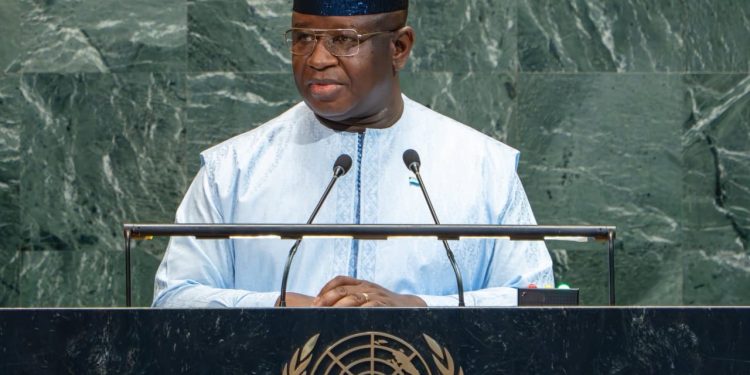By Hassan Osman Kargbo
President Julius Maada Bio took the stage at the 80th United Nations General Assembly (UNGA) in New York, delivering a speech that mixed ambition with controversy. While he spoke strongly about Africa’s place in global politics, many observers say his words fell short of giving clear answers to Sierra Leone’s own challenges.
In his address, Bio highlighted Africa’s long-standing demand for reform of the United Nations Security Council. Speaking as coordinator of the Committee of Ten (C-10), he repeated the call for Africa to gain permanent seats and veto power. According to him, the current structure is unfair, and Africa deserves an equal voice in global decision-making.
He also stressed that smaller nations should not be overlooked, saying that the size of a country does not reduce its sovereignty or responsibilities. His call for equality struck a chord with some diplomats in the hall.
However, critics back home were not as impressed. Many point out that Bio’s speech was heavy on ideals but light on practical solutions. For example, while he spoke about fixing trade imbalances, tackling climate challenges, and addressing debt problems, he gave little detail on how Sierra Leone or Africa would achieve these goals.
Another area of concern is credibility. Sierra Leone is still recovering from the bitter dispute over the 2023 elections, which many believe lacked transparency. Critics argue that before Bio can call for fairness and justice abroad, he must prove that same commitment at home. Some commentators described his UN appearance as more show than substance, claiming that international speeches cannot hide local frustrations.
On the other hand, supporters of the president see his UN appearance as a sign of Sierra Leone’s rising influence. With Bio set to become the next chairman of ECOWAS, they believe his global profile will open doors for Sierra Leone and give the country a stronger voice in African and international affairs.
Still, many ordinary citizens remain skeptical. They want to see improvements in governance, job creation, and economic management rather than hear lofty speeches abroad. Without clear plans and measurable steps, critics say, Bio’s words risk sounding like promises that will not reach the people who need change the most.
Analysts believe the president now faces a choice. If he wants his global message to be taken seriously, he must back it up with action at home. That means improving transparency in government, addressing election concerns, and setting out clear strategies to boost the economy and reduce poverty.
President Bio’s UNGA speech showed ambition and gave Sierra Leone visibility on the world stage. But for many, it raised more questions than answers. Will his calls for reform and fairness translate into action for Sierra Leoneans? Or will they remain words spoken to an international audience far from the realities of daily life back home?
Only time will tell whether the speech marks a turning point or becomes another missed opportunity.













